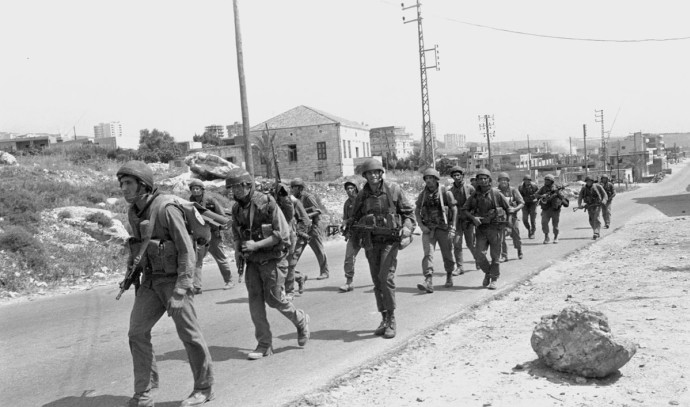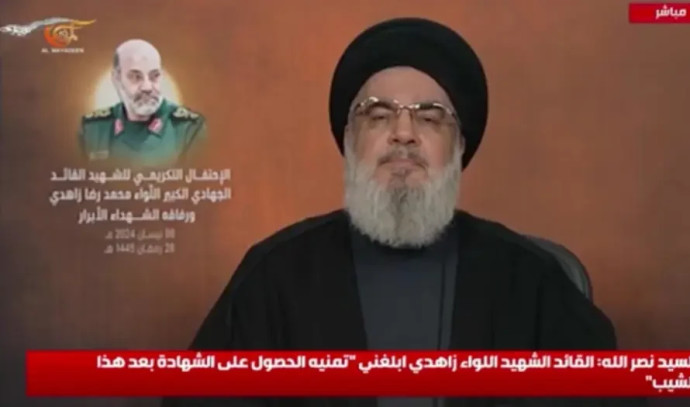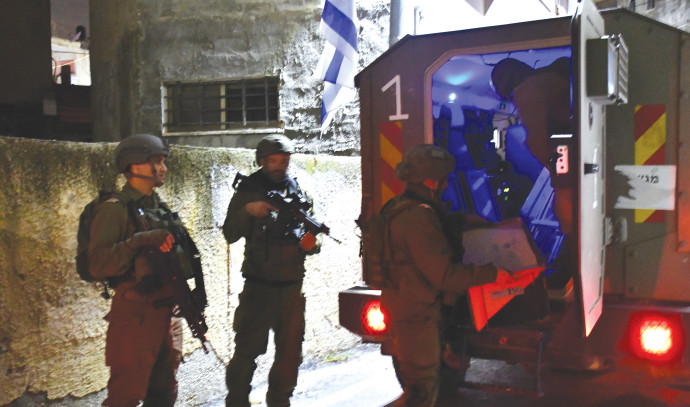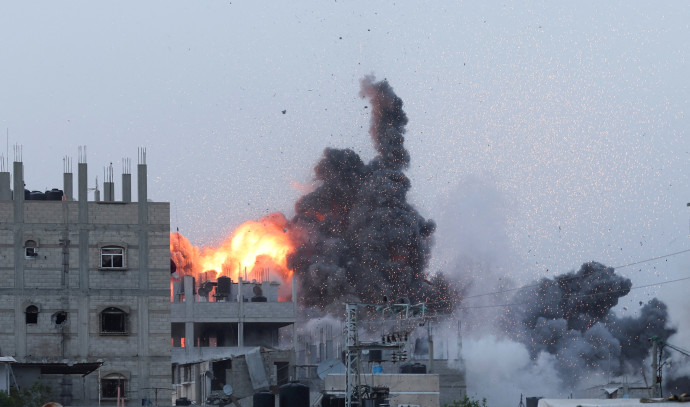world news
Operation Peace for Galilee: Israel’s 1982 military action in Lebanon

“Please give me a permit – I must go to Israel to see my son in the hospital.” The woman in the blue dress with the anxious eyes was not addressing me in the crowded public square at Tyre.
She was plucking at the sleeve of the IDF spokesman who was explaining to me the local situation – they’d had water for two weeks, and the electricity was also now turned on… facts and figures that seemed unimportant against the urgency of the woman’s pleas. Wearily, he told her it was not his function and pointed out where to wait – where he had already directed scores of others anxious to move to Israel or to rejoin relatives up north in Beirut. Most of them stood patiently next to a truck piled with blankets that would later be distributed to those who needed them.
Later, I went over to her. “Can you help me get a permit?” she asked, clutching at straws. Amira would have been an attractive woman under different circumstances. She was about forty, well dressed, a gold cross around her neck. But the worry lines around her eyes and mouth were already etched deeply. Like many from southern Lebanon, now that the PLO had been routed, she had returned to her home in Tyre from Beirut, where she had fled with her son. But he’d been caught in the crossfire a week before and taken by helicopter to a hospital in Nahariya. “It is good to come home” she told me. “My house is fine; not even a broken window, and wonderful to know that I am safe from ‘them.’ But I can’t start my life again properly until my son is better and can live with me. I want to visit him.”Remembering Tyre amid Israel’s operations in Lebanon in 1982
Tyre is a picturesque town. We drove there from Naqoura, where the UNIFIL forces have their headquarters – it’s a Western-style shanty town, like something from an old cowboy movie. It has a Silver Coast restaurant, clothing store, a barber shop and “coiffure de dames” for the Swedish nurses at SWEDMEDCO opposite. But Tyre, 20 km. from the border, is different. The shopping center was doing a brisk trade on this Sunday morning, particularly Patisserie Arabe – a giant cake shop with the kind of mouth-watering confections that I’d only seen in Groppi’s coffee house in Cairo. A 10-tier wedding cake dominated the window.
The proprietor, Mr. Ramlawi, was doing business as usual, despite the war – business better than usual, one of my companions remarked cynically. Whether he was happy that Israel had cleared the PLO out of Tyre or was benefiting from the influx of soldiers and journalists in town, Mr. Ramlawi did seem very cheerful indeed. He even had the word “Open” lettered in Hebrew on his door (in fact, there were many shops with Hebrew signs, some even offering discounts for soldiers). “You are welcome in this country” he informed me, noticing my IDF liaison officer waiting nearby. “When the terrorists were here, they would come in my shop, ten at a time, taking whatever they wanted. Food, money, drinks. It is good that you got them out.”
It is thought that there are still many PLO terrorists in Tyre, but the townspeople regularly inform on them, either to the IDF or to their local bishop. About 90 had been turned in the week before.
Tyre has a romantic location, situated around a tiny bay with a marina. Several fishermen were wading in the water, patiently waiting for a bite. The skyline of minarets, spires, and domes reminded me of Acre.
Just outside Tyre, we visited the archaeological site of a Roman stadium from 13 BCE. The third-largest in the world, it is well preserved. The enormous hippodrome was used for chariot races and gladiatorial combat. Behind the rows of seats were cleverly concealed rooms built by the PLO. It was from this site that rockets were launched at Nahariya. Israel knew this, but did not bomb it in order to preserve the magnificent ruins. We’d looked in the dark bunkers, now filled with the ugly remnants of war – spent shells, tin helmets, terrorist literature. There was a rancid stench of decay.
When we came out again into sunshine, there was an elderly man with a cane and a smart straw hat, who seemed eager to show us around. He spoke a strange kind of English, very old-fashioned. He was neither friendly nor unfriendly. He said his name was Zyklowi. He motioned us to follow him, and I had to trot to keep up with him. All the time, he was giving a kind of monologue about the amphitheater. “See these flat stones – they were altars. Human sacrifice,” he stated.
I would nod and try to interrupt with questions of my own – but about today, not the past. These he would ignore, pretending not to understand. “Here you see three layers of civilization – under this Roman Road, you can see the Greek … and this is Byzantine.”
“I just wanted to ask you –”
“Here is an aqueduct,” he would interrupt me. “It carried water out five miles.”
“The bunkers, Mr. Zyklowi, did you know about them?”
“I am guide,” he said after a pause. “I work here.”
He would say nothing more. He waited expectantly. We gave him a tip.
It was like a holiday scene when we crossed the Litani River. The banana plantations looked splendid in the hot sun. Soldiers in bathing suits did their laundry in the river, with towels and underwear strung up to dry. Every building seemed to be flying a flag. Over some, fluttered the Lebanese flag – two red stripes, and a white central stripe with a stylized cedar tree in the center. A few houses had the Phalange flag, but most – to be safe – flew a large white flag of surrender. I thought that if I’d been living through an eight-year war, I’d fly a white flag too.
On the road to Sidon, the scenery continued to be beautiful… sparkling sea striped in bands from light aqua to deep indigo; and the green of figs, grapevines, and lemon orchards. When we reached Sidon, there was a demonstration by women – they were screaming, and some were crying. I was told they were the partners of male Palestinian prisoners. A soldier fired twice in the air, shockingly close to us, and they dispersed. Sidon reminded me of Haifa.
There was bomb damage, but not a lot. I had expected it to be worse. What had once been an elegant villa had the roof damaged – it sat at a drunken angle, ludicrous atop the white façade and fluted columns in front. Through the open door, I glimpsed high ceilings, crystal chandeliers, velvet drapes, and a parquet floor. A young man came out. “You can’t go up,” he told our photographer, who had asked permission to shoot scenes from the top floor. “It’s locked. I don’t have a key,” the man repeated several times. I asked him if he was glad that Israel had come to his country. His facial expression became guarded. “You do good job” he finally acknowledged. “PLO bad people – get them out. Then you must go too. PLO, Syrians, Israelis – you must all go home.”
In the center of town, a woman was directing a group of children sweeping the street in front of a slightly damaged building. She was blonde and looked American. I went to talk to her, but she shook her head – she only spoke Arabic. Suddenly I was surrounded by children, all wanting to be photographed with me. They laughed and chattered like happy kids anywhere.
Just before Beirut where we were turned back, the sounds of battle were frighteningly loud, and 155mm. cannons were firing over our heads. We headed for the mountains. En route, we stopped for refreshments at a diner on the beach front with the unlikely name Sands Rock Beach. Hard to believe that the war was just a few kilometers away. People sat on the terrace eating grilled chicken and chips; sipping cans of 7-UP. Pretty girls in bikinis showed off their suntans, and the beach was crowded with Sunday pleasure-seekers.
We tried to find a word to describe the Lebanese people who were swimming, eating, and enjoying themselves, seemingly indifferent to battle sounds from Beirut. We began with “placid,” moved on to “calloused,” “impervious,” “resigned,” and “uncommitted.” None of them seemed to convey the right shade of meaning. Maybe “fatalistic”?
One of our last stops was at Jazzinem, a beautiful village high in the mountains. Unbelievable, considering where we were… a peaceful Sunday afternoon promenade. No signs of the war at all – no bomb damage, nothing to convey that you weren’t holidaying in the Swiss Alps. Girls walked in pairs, fingers linked, in high-heeled sandals. jewelry, and makeup. One pretty girl wore a T-shirt that proclaimed in silver and pink: “Sweet things remind me of you.” What brought us back to reality was when the four of us – my three male companions and I – went into a coffee house, where men were playing backgammon and cards. The sudden cessation of activity and uncomfortable glances as we sat down at a table made us realize our faux pas. A man at the next table, smoking a nargila water pipe, talked to my companions, ignoring me. It seemed the coffee house was for men. The women were home with the children or talking to their friends. The waiter served us with averted face.
Darkness was falling when we were on the road to Nabatiye – a terrible road fit only for donkeys. The sun sat low in the sky, an orange disc with drifts of blue cloud floating across it. The light became pink, blue, and finally black. We drove quickly, trying to reach the border before the curfew. We didn’t make it and were stopped angrily at checkpoints, where soldiers of different allegiances shouted at us.
Eventually we crossed the Israeli border and began the long drive back to Jerusalem through the silent night, where the only sounds I heard were the voices from Lebanon, repeating their words in my ears like the rerun of an old movie. ■
The writer is the author of 14 books. She can be contacted at: dwaysman@gmail.com
world news
‘When America’s weak, the axis strengthens’: Fmr. Mossad official says Hezbollah fears war

Oded Ilam, a former senior Mossad official, spoke recently with Arel Segal on his show on 103FM radio to discuss the implications of Biden’s failure in the recent presidential debate against Donald Trump and the possible escalation in the North.
Ilam began by saying, “The Americans, although I don’t think they are anti-Israeli, continue to misunderstand the situation we are in. Biden and his administration have their hearts in the right place. The famous ‘warning’ that Biden gave to the Iranians didn’t move them at all. They attacked Israel anyway, and the American response was that the administration issued condolences for Raisi’s death. The American administration repeatedly shows weakness, which is also reflected in the ongoing negotiations.”
“Every time Hamas does not accept a deal with Israel, we are forced to step back two more steps. It is hard for me to see a situation where Hamas allows us to write up another agreement that doesn’t include withdrawing from the Philadelphi Corridor,” Ilam noted. “I can assume that when America is weak, the axis strengthens. This confrontation is very significant. I saw Biden’s performance in Atlanta, where he was different than at the recent debate. He was excellent. The same team that advised him to go to the debate is exactly the same team that shapes America’s policy.”
Israel-Lebanon conflict parties aim to avoid war
Ilam further added that “the Israel-Lebanon situation is interesting. All four main players, the US, Lebanon, Hezbollah, and Israel, do not want war. The one who least wants war is Nasrallah, who entered the situation in a very difficult state, both economically and in terms of his legitimacy from within Lebanon itself.”
“All four players do not want war. Nasrallah is waiting for the moment when Sinwar signs an agreement. I think they are sending him messages to urge him to sign. Even if this does not happen, the chance of a full-scale war decreases in favor of a settlement. Is a settlement good for Israel based on the current situation? That is another question,” Ilam concluded.
Edited by Michal Kedosh for 103FM radio.
world news
IDF forces demolish home of terrorist who murdered 14-year-old West Bank shepherd

IDF forces began demolishing the house of Ahmed Duabsha, a terrorist from the village of Duma, according to Ynet reported on Tuesday night.
Duabsha had been responsible for the murder of Binyamin Achimair, a 14-year-old shepherd, in April.
The terrorist was arrested on April 12 by The IDF, Shin Bet, and Israel Police during an overnight operation.
Duabsha admitted during interrogation to assaulting the teenager, which resulted in his death.About Binyamin Achimair
Achimair had been missing for 24 hours before his body was discovered on April 13.
Achimair had left Gal farm in the Samaria region of the West Bank on the morning of April 12 to allow his sheep to graze, and after several hours, the herd returned without him.
After news of Achimair’s body being found, a few violent incidents – including setting cars on fire – happened in the village Duma, and one person was killed by settler gunfire according to Palestinian reports, Walla reported at the time.
YUVAL BARNEA contributed to this report.
world news
IDF strikes West Bank terror cell as they plant explosive devices

Aircrafts carried out a targeted strike on Tuesday night on the Nur Shams camp, in the West Bank, eliminating a terror cell as they placed explosives, Israeli media reported. The IDF surrounded the squad and attacked it from the air while it was placing the devices.
Maariv, citing Palestinian reports, claimed that 5 people were killed in the strike. The report indicated that only one of the 5 killed were terrorists and that several others were wounded. The Palestinian Health Ministry placed the number of casualties at 4, according to Reuters.
The attack took place near an incident in Jenin in which 22-year-old Captain Alon Sacgiu was killed after his vehicle hit one of the explosive devices.
Uptick in attacks in the area over the last 3 days
This is the third attack in the last three days and, since the outbreak of the war, more than 50 attacks have been carried out in the area.
The Palestinian Health Ministry claimed that Israeli fire, following a military vehicle hitting an explosive device, resulted in the death of a woman and a child.
The ministry did not comment on the age of the child or whether those reportedly killed or wounded were engaged in attacks on the Israeli personnel operating in the area.
Sergeant-Major (Res.) Yehuda Geto, 22, was killed after hitting explosives.
The incident occurred during an operation to counter terrorism in the camp. According to the details of the initial investigation, a bomb exploded under a military vehicle where Geto, who served as a driver in the unit, and a commander were inside.
The IDF said that the military vehicle was in an area where there was no risk of explosives, therefore no searches were conducted for them, Israeli media reported.
-

 Solar Energy3 years ago
Solar Energy3 years agoDLR testing the use of molten salt in a solar power plant in Portugal
-

 Camera3 years ago
Camera3 years agoCharles ‘Chuck’ Geschke, co-founder of Adobe and inventor of the PDF, dies at 81
-

 Camera3 years ago
Camera3 years ago80,000MP panoramas: EarthCam announces world’s highest-resolution robotic webcam
-

 Solar Energy7 months ago
Solar Energy7 months agoGlencore eyes options on battery recycling project
-

 Camera8 months ago
Camera8 months agoDJI Air 3 vs. Mini 4 Pro: which compact drone is best?
-
world news8 months ago
Gulf, France aid Gaza, Russia evacuates citizens
-
world news3 months ago
Jewish diaspora expresses concern as Iranian drones launch toward Israel
-

 TOP SCEINCE3 months ago
TOP SCEINCE3 months agoStellar winds of three sun-like stars detected for the first time

